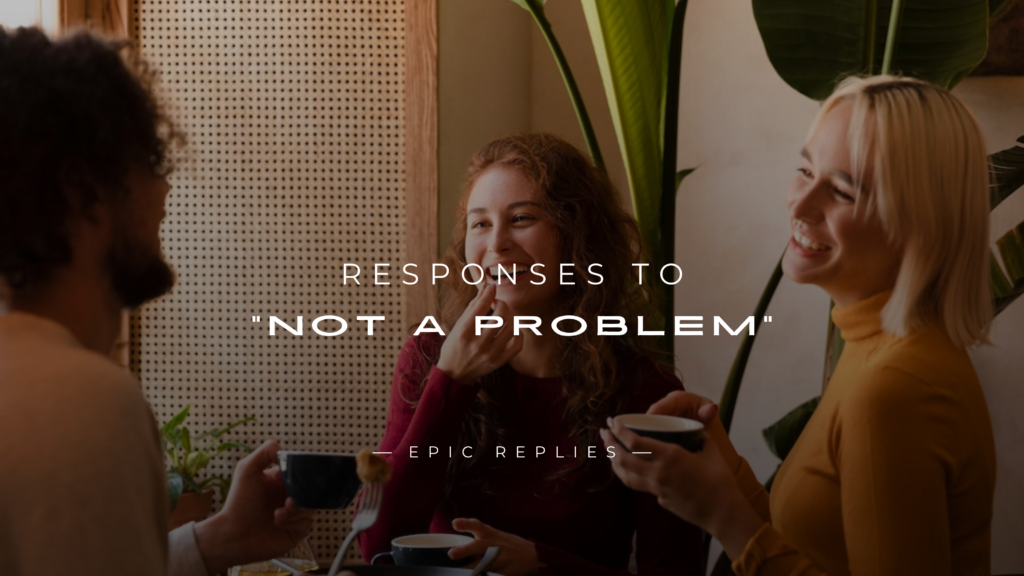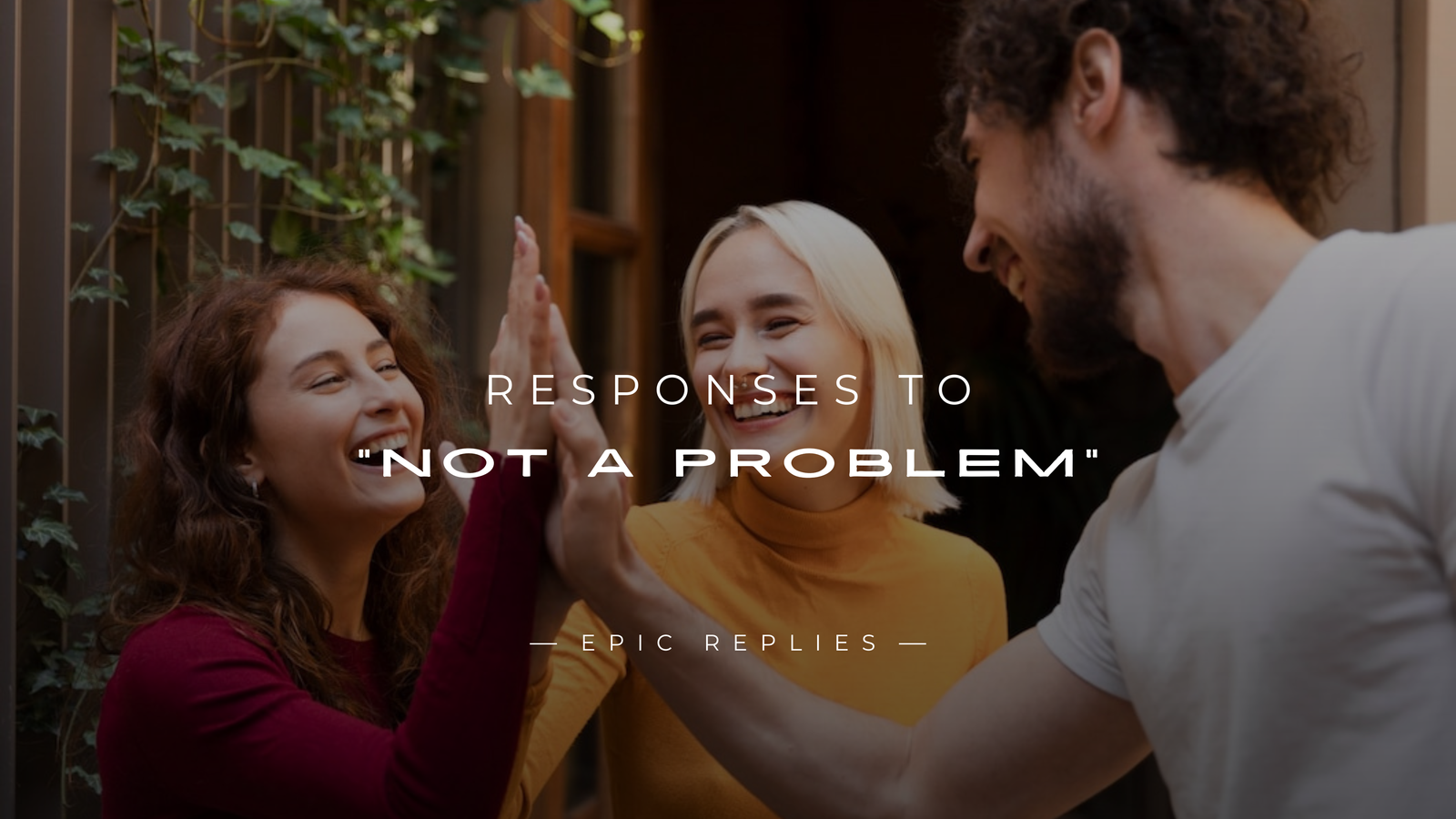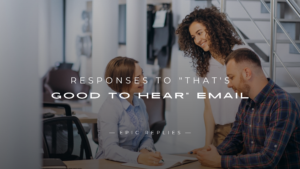Have you ever said “Thank you,” only to hear “Not a problem” in response—and then paused, wondering if there was a better reply or if it meant something more? You’re not alone.
This little phrase, “Not A Problem”, might seem harmless, but it can carry a surprising amount of nuance.
In today’s world, where tone, intent, and delivery matter more than ever, the way we respond to kindness, help, or gratitude says a lot about us.
So, what’s really going on when someone replies with “Not A Problem”? Is it polite? Is it dismissive? And how the heck are we supposed to respond to it?
Let’s dig into this modern linguistic twist and explore how to respond to “Not A Problem” in ways that are respectful, lighthearted, or even professional—depending on the situation.

220+ Responses to “Not A Problem”
Gratitude
- Thanks so much, that means a lot.
- I really appreciate it, seriously.
- Thanks again—you’re a lifesaver.
- I can’t thank you enough!
- That’s so kind of you, thank you.
- Much appreciated, truly.
- Thanks a ton, I owe you one.
- Grateful as always, thank you.
- Really, thank you for making it easy.
- Thanks! You just made my day a little better.
Acknowledgment
- Got it, thank you.
- Cool, appreciate it.
- Alright, sounds good.
- Great, thanks for letting me know.
- Okay, I’ll keep that in mind.
- Perfect, thanks again.
- Good to know.
- Sweet, thanks.
- Will do, appreciate it.
- All set on my end, thanks!
Polite Reciprocation
- Thanks! Let me know if I can return the favor.
- Appreciate it—happy to help you sometime too.
- Awesome, and if you need anything, just ask.
- Thanks a lot, and same goes for you.
- You’re the best—always here if you need help too.
- Thanks! I’ve got your back as well.
- Let me know if I can do anything in return.
- Thanks, I really mean it. Hope I can return the kindness.
- That’s really thoughtful—appreciate you, and I’m around if you need anything.
- Thanks again, I’m just a message away if you need help.
Humor
- Glad I’m not a huge problem, then.
- Good to know I haven’t been banned yet!
- I was worried I’d have to bribe you.
- That’s a relief—I’ve been a problem all day.
- Guess I’ll cancel my apology fruit basket.
- Phew, dodged that bullet.
- Wow, I thought I owed you $500 now.
- Not yet a problem, you mean?
- Well, give it time, I can become one.
- Alright, I’ll try harder next time to be a challenge!
Curiosity
- Are you sure? I hope I didn’t make things tough.
- Really? Let me know if anything was off.
- I’m glad! Was everything okay on your end?
- Hope that didn’t take too much of your time.
- Appreciate it—just checking, everything went smooth?
- That’s good to hear! You sure it wasn’t a hassle?
- Did I make anything more complicated than it needed to be?
- All okay? Please be honest.
- Thanks—did you have to fix anything afterward?
- If there’s anything I should do differently next time, let me know!
Formal Response
- Thank you. I appreciate your assistance.
- Understood, and thank you once again.
- That’s reassuring. I’m grateful for your help.
- I appreciate your support and understanding.
- Thanks for taking the time to assist.
- Your cooperation is much appreciated.
- Noted. Thank you for your patience.
- I’m thankful for your effort on this.
- Many thanks for your professionalism.
- A sincere thank-you for your help today.
Friendly Banter
- You say that now… wait till part two!
- You’re too nice—admit it was kind of a problem.
- And here I was, preparing my apology speech.
- That’s a first! I usually am a problem.
- You’re the MVP—again.
- Wow, you’re really putting up with me today!
- This is why I keep bothering you.
- Dangerous words—I might take advantage of that.
- You’re spoiling me with this kindness!
- Noted. I’ll keep the chaos coming, then.
Downplaying the Help
- I barely asked for anything, but still—thanks.
- It wasn’t a big deal, but I appreciate your help.
- That was such a tiny request—I feel bad!
- Honestly, it wasn’t much, but I’m thankful.
- I know it was small, but thanks anyway.
- I hate bothering you with such little stuff.
- That was just a quick thing—thanks for being chill.
- Probably took you two seconds, but thanks all the same.
- It was nothing major, still feels good to be helped.
- You probably didn’t even break a sweat!
Light Sarcasm
- Oh great, I’m finally not a burden.
- Wow, that’s rare—I’m usually a problem.
- I’ll take that as a compliment!
- What a shocker—no complaints today!
- That’s a first—write it down!
- Wow, I must be improving.
- Are you sure you’re talking to me?
- Color me surprised.
- I should frame that response.
- I’ll be milking that for the rest of the week.
Professional Gratitude
- Thank you, your support made a difference.
- I really appreciate the prompt help.
- That was incredibly helpful—thank you again.
- I value your assistance and time.
- You’ve been a huge help.
- I’m grateful for your responsiveness.
- Thank you for stepping in so quickly.
- Your professionalism is truly appreciated.
- Thank you for handling that so smoothly.
- I sincerely appreciate your efforts.
Expressing Relief
- Oh, that’s a relief—thank you.
- I was a little worried, so that’s good to hear.
- You have no idea how much that eases my mind.
- Phew, glad to hear it wasn’t a hassle.
- That makes me feel better, thanks.
- I’m so glad it didn’t cause trouble.
- Thank goodness, I thought I’d messed something up.
- Huge relief—thank you for being so cool about it.
- That’s great to hear, I really appreciate your patience.
- Wow, I was bracing for impact—thanks for being so chill.
Affirmation
- Awesome, I thought it’d be okay!
- That’s what I figured, thanks for confirming.
- Glad to hear it, I wasn’t too worried.
- Perfect, that’s what I was hoping for.
- Makes sense—thanks again.
- Alright, we’re on the same page then.
- Cool, that works for me.
- Good to hear—we’re all set.
- Sounds about right, thanks.
- That’s reassuring, appreciate it.
Reflective
- I’m really lucky to have someone like you help out.
- You always make things easier—thank you.
- I appreciate how you never make me feel like a bother.
- It’s always nice to be met with kindness like that.
- You handle things so calmly, and it’s admirable.
- Every time I reach out, you make it smooth.
- That kind of attitude really makes a difference.
- You’re always gracious—thank you.
- Honestly, working with you is always a pleasure.
- People like you are what keep things running smoothly.
Encouraging
- You’re amazing, thank you!
- Seriously, you always make things work.
- That’s why I love working with you.
- You make it all look so easy.
- You handled that like a pro.
- You’ve got such a calm way of helping—appreciate it.
- You’re seriously the best, thank you.
- You’ve got the magic touch, clearly.
- Always impressed by how you handle stuff.
- You’re a real one—thanks again.
Formal Clarification
- Good to know—thanks for confirming.
- Understood, and I appreciate the update.
- That clears things up, thank you.
- Appreciate the clarification, I’ll proceed accordingly.
- Thanks for confirming, that helps a lot.
- That’s all I needed to know—much appreciated.
- Acknowledged, and thank you for your time.
- Great, I’ll make a note of that.
- Thanks again for confirming everything’s in order.
- Noted, and I appreciate your response.
Confident Agreement
- Thought so, but thanks for confirming!
- Exactly what I expected—cheers.
- I figured it was no biggie.
- That’s what I like to hear.
- I knew I could count on you.
- That’s the spirit!
- Yup, didn’t think it would be.
- We’re in sync—love that.
- Good to know we’re on the same page.
- Sounds right to me!
Apology Follow-up
- Thanks for being so understanding.
- I really appreciate your patience with me.
- I’m glad it didn’t cause an issue—thank you.
- Thanks, I’ll be more mindful next time.
- Appreciate you letting that slide.
- Thanks again—I was worried it was a bigger deal.
- That’s kind of you to say.
- Thanks for cutting me some slack.
- I owe you one—thanks for not making it a thing.
- Your understanding means a lot, truly.
Nonchalant
- Cool, appreciate it.
- Alright, no worries then.
- Sweet, thanks.
- All good, thanks for that.
- Chill, that works.
- Awesome, no stress then.
- Great, moving right along.
- Dope, thanks again.
- Perfect, carry on.
- Alrighty, works for me.
Gratitude with Offer
- Thanks so much—let me know if you ever need a hand.
- Really appreciate it. If there’s anything I can do, just say the word.
- That means a lot—happy to return the favor anytime.
- Thanks again. Don’t hesitate to ask if I can help with something.
- You’re awesome—if you ever need anything, I’m around.
- Appreciate it! I’ve got your back too.
- That was kind of you—next round’s on me.
- Thanks! And if I can ever return the kindness, let me know.
- Seriously, thank you. I owe you one.
- Appreciate it—I’ll be here if you need something too.
Mild Reassurance
- Still, thanks for being flexible.
- I’m glad it wasn’t a bother, but I appreciate you all the same.
- It seemed small, but I know time’s valuable—thanks again.
- Even if it was easy, I really appreciate your help.
- It may not have been a problem, but it meant a lot to me.
- Good to hear, but I still appreciate the effort.
- That’s great, and thank you for being so cool about it.
- I’m relieved it didn’t cause trouble—your help still matters.
- That’s comforting, and your support didn’t go unnoticed.
- Good to know, and still—thank you for stepping in.
Light Dismissal
- Alright, just checking!
- Cool, just making sure.
- Okay then, moving on.
- All good, didn’t think it would be.
- Makes sense, thanks.
- Okay, no biggie.
- Thought so, appreciate it.
- Okay cool, no further questions.
- Gotcha, thanks for the quick note.
- Right on, back to business.
Personal Touch
- You’re always so thoughtful—thank you.
- That’s why I love working with you.
- You make things feel easy, and that’s a gift.
- I always feel at ease knowing you’re on it.
- You’re one of the most reliable people I know.
- Seriously, you always come through for me.
- That’s why I keep coming to you!
- You make everything smoother—thank you.
- You’re the best, hands down.
- Just another reason I appreciate you so much.
Why This Phrase Matters in Conversations
Language evolves. What used to be polite and proper (“You’re welcome”) has now been joined—or even replaced—by newer, more relaxed expressions like “No worries,” “Anytime,” or “Not A Problem.”
The thing is, how we respond to gratitude sets the tone for future communication. Responding well can build rapport, while a mismatched tone might leave someone feeling awkward or dismissed.
Understanding the Common Use of “Not A Problem”
In casual, everyday conversations, “Not A Problem” is typically meant to express ease—like saying, “It wasn’t a big deal. I was happy to help.” It’s informal, friendly, and often used by younger generations or in laid-back settings.
However, context is everything. In some settings, this phrase might sound too casual—or worse, passive-aggressive. That’s why knowing how to respond appropriately is such a handy skill.
The Meaning Behind “Not A Problem”
- Literal vs. Implied Meaning
Literally, “Not A Problem” means the person had no trouble helping you. It’s meant to ease any guilt or awkwardness you might feel for needing assistance. However, it can also imply that there could have been a problem, which is why some people feel weird about it.
- The Shift from “You’re Welcome” to “Not A Problem”
The phrase “You’re welcome” carries a sense of formality and tradition. In contrast, “Not A Problem” is part of a linguistic trend toward informality. It’s more relaxed and feels less transactional, especially among millennials and Gen Z.
You’ll hear it often in tech, startups, cafes, and modern service industries. But that doesn’t mean it’s always the best fit.
Is “Not A Problem” a Problem?
- Why Some People Dislike It
Some folks interpret “Not A Problem” as passive-aggressive or slightly dismissive.
It may come across as if the person is doing you a big favor and wants to emphasize that this time it wasn’t an issue.
It can also seem like they’re brushing you off with minimal acknowledgment.
- Cultural and Generational Differences
Language is deeply tied to culture and upbringing. Older generations or people from more formal cultures often expect more traditional responses like “You’re welcome” or “It was my pleasure.” To them, “Not A Problem” might seem flippant or overly casual.
Context Matters – Situational Usage
Casual Conversations
In laid-back conversations with friends or coworkers, “Not A Problem” is generally harmless. It’s just another way of saying, “No big deal.”
Response examples:
- “Thanks again!”
- “I really appreciate it.”
- “Cool, thanks!”
Workplace or Professional Settings
Here’s where things get a little tricky. In emails or meetings, “Not A Problem” might sound too relaxed or even unprofessional. If someone uses it, responding in a balanced tone can help maintain professionalism.
Response examples:
- “Thank you, I appreciate the quick response.”
- “That’s great, thank you!”
- “Thanks for handling that so quickly.”
Customer Service Interactions
If you’re a customer and someone says “Not A Problem,” it’s usually meant to reassure you. But if you’re the service provider, it’s better to say something warmer and more customer-centric like “Happy to help” or “My pleasure.”
How to Respond to “Not A Problem” Politely
Simple and Neutral Responses
Sometimes, you just want to keep it straightforward and kind. Neutral responses are great when you don’t want to overthink the interaction.
Examples:
- “Thanks again, really appreciate it.”
- “Glad to hear that!”
- “Appreciate the help!”
- “Much appreciated.”
Friendly and Warm Responses
If you want to add warmth or build a better relationship, you can mirror their tone but add a little extra appreciation.
Examples:
- “You always come through—thank you!”
- “You’re a lifesaver. I owe you one.”
- “Couldn’t have done it without you.”
This keeps the interaction personal and memorable.
When Humor Helps – Lighthearted Replies
Fun, Playful Ways to Keep the Mood Light
If you’re close with the person, humor can go a long way. It keeps the mood light and can turn a small exchange into a bonding moment.
Examples:
- “Oh good! I was worried it was a problem!”
- “You deserve a gold star then!”
- “Let’s hope it’s never a problem!”
Just be sure your tone matches the relationship.
Assertive or Thoughtful Responses
When the Phrase Feels Off-Putting
If you’re on the receiving end of a curt or cold “Not A Problem,” and it doesn’t sit right, you can shift the tone back toward appreciation.
Examples:
- “Well, I know it might’ve been, so thank you for your time.”
- “Still, I appreciate you going out of your way.”
- “Thanks again—it really did help me out.”
These kinds of responses gently redirect the energy without creating conflict.
Redirecting the Tone Without Being Rude
Sometimes you want to encourage more thoughtful interactions. Modeling warm, polite language often leads others to do the same.
Try:
- “You’re very welcome!”
- “Anytime! I’m happy to help.”
- “Thanks, I appreciate the kindness.”
Miscommunication and Tone Issues
- How “Not A Problem” Can Be Misread
Tone is everything. Said with a smile, “Not A Problem” feels friendly. But typed in an email or text, it can sound cold or sarcastic.
This is why people sometimes get the wrong impression—especially if they’re reading instead of hearing it.
- Tips to Avoid Assumptions
Before jumping to conclusions, consider the person’s intent. If it’s someone you trust or like, assume the best. If it’s a new relationship, focus on being kind and respectful in your reply.
Alternatives to “Not A Problem”
What to Say Instead in Different Contexts
Professional Settings:
- “Of course.”
- “Certainly.”
- “Happy to help.”
Casual Conversations:
- “No worries.”
- “Anytime!”
- “Sure thing!”
Customer Service:
- “My pleasure.”
- “Absolutely!”
- “It’s what I’m here for.”
Mixing it up keeps your responses fresh and genuine.
Teaching Kids or ESL Learners the Right Tone
- Role of Tone and Politeness in Language Learning
For kids or non-native English speakers, tone isn’t always easy to grasp. Teaching context—when to use formal vs. informal replies—is just as important as vocabulary.
Use role-play and example scenarios to help them hear and feel the difference in tone.
The Psychology of Gratitude and Response
- Why Words Matter in Human Connection
Responding to gratitude isn’t just polite—it strengthens emotional bonds. Whether you say “Not A Problem” or “You’re welcome,” it’s a chance to reinforce kindness and make someone feel seen.
We’re all wired to respond positively to appreciation. The more mindful we are in how we communicate, the more connected we become.
Conclusion
No matter the context—whether you’re chatting casually, responding professionally, or adding a touch of humor—having a variety of ways to reply to “Not a Problem” can keep your conversations fresh and engaging. These 220+ responses give you the flexibility to match your tone and personality perfectly in any situation. If you’re looking to strengthen other relationships with thoughtful words, check out our 220+ Loving “Nice Things To Say To Your Brother” for heartfelt ideas that show appreciation and care.
FAQs
Q. Why do people say “Not A Problem” instead of “You’re Welcome”?
It feels more relaxed and modern. It’s a casual way of saying, “No worries, I was happy to help.”
Q. Is it rude to respond with “Not A Problem”?
Not necessarily, but in some settings, it can sound dismissive or overly casual. It depends on the tone, context, and relationship.
Q. What should I say if “Not A Problem” annoys me?
You can politely shift the tone by replying with something warmer like, “Thanks again, that really helped.” Or use “I appreciate your time.”
Q. Is “No Problem” the same as “Not A Problem”?
Pretty much, yes. “No problem” is just a shorter, slightly more casual version. The meaning is nearly identical.
Q. How can I respond professionally to “Not A Problem”?
Try saying, “Thanks, I appreciate it,” or “Great, thank you again.” Keep it courteous and aligned with a professional tone.




